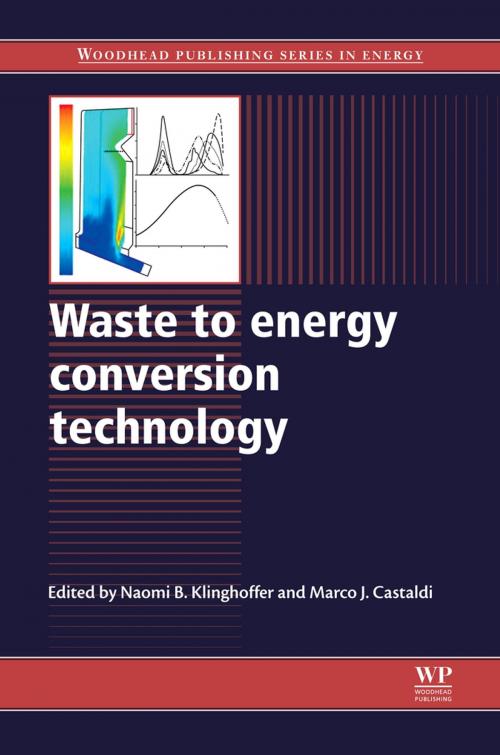| Author: | ISBN: | 9780857096364 | |
| Publisher: | Elsevier Science | Publication: | May 15, 2013 |
| Imprint: | Woodhead Publishing | Language: | English |
| Author: | |
| ISBN: | 9780857096364 |
| Publisher: | Elsevier Science |
| Publication: | May 15, 2013 |
| Imprint: | Woodhead Publishing |
| Language: | English |
Increasing global consumerism and population has led to an increase in the levels of waste produced. Waste to energy (WTE) conversion technologies can be employed to convert residual wastes into clean energy, rather than sending these wastes directly to landfill. Waste to energy conversion technology explores the systems, technology and impacts of waste to energy conversion.
Part one provides an introduction to WTE conversion and reviews the waste hierarchy and WTE systems options along with the corresponding environmental, regulatory and techno-economic issues facing this technology. Part two goes on to explore further specific aspects of WTE systems, engineering and technology and includes chapters on municipal solid waste (MSW) combustion plants and WTE systems for district heating. Finally, part three highlights pollution control systems for waste to energy technologies.
Waste to energy conversion technology is a standard reference book for plant managers, building engineers and consultants requiring an understanding of WTE technologies, and researchers, scientists and academics interested in the field.
- Reviews the waste hierarchy and waste to energy systems options along with the environmental and social impact of WTE conversion plants
- Explores the engineering and technology behind WTE systems including considerations of municipal solid waste (MSW) its treatment, combustion and gasification
- Considers pollution control systems for WTE technologies including the transformation of wast combustion facilities from major polluters to pollution sinks
Increasing global consumerism and population has led to an increase in the levels of waste produced. Waste to energy (WTE) conversion technologies can be employed to convert residual wastes into clean energy, rather than sending these wastes directly to landfill. Waste to energy conversion technology explores the systems, technology and impacts of waste to energy conversion.
Part one provides an introduction to WTE conversion and reviews the waste hierarchy and WTE systems options along with the corresponding environmental, regulatory and techno-economic issues facing this technology. Part two goes on to explore further specific aspects of WTE systems, engineering and technology and includes chapters on municipal solid waste (MSW) combustion plants and WTE systems for district heating. Finally, part three highlights pollution control systems for waste to energy technologies.
Waste to energy conversion technology is a standard reference book for plant managers, building engineers and consultants requiring an understanding of WTE technologies, and researchers, scientists and academics interested in the field.
- Reviews the waste hierarchy and waste to energy systems options along with the environmental and social impact of WTE conversion plants
- Explores the engineering and technology behind WTE systems including considerations of municipal solid waste (MSW) its treatment, combustion and gasification
- Considers pollution control systems for WTE technologies including the transformation of wast combustion facilities from major polluters to pollution sinks















